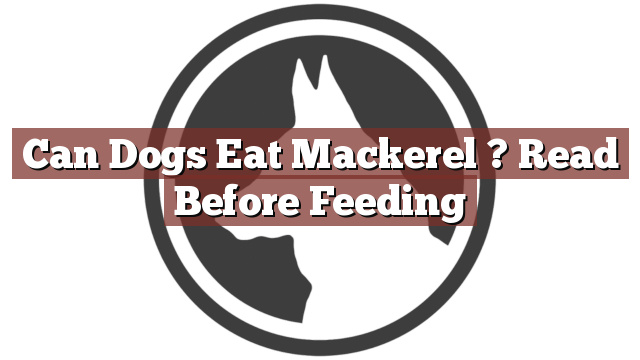Understanding Your Dog’s Dietary Needs
As a responsible dog owner, it is crucial to understand your furry friend’s dietary needs. Providing a balanced and nutritious diet is essential for their overall health and well-being. While it may be tempting to share your meals with your canine companion, not all human foods are safe for them to consume. Before introducing any new food into your dog’s diet, it is crucial to research and consult with your veterinarian to ensure it is safe and beneficial for them.
Can Dogs Eat Mackerel? Read Before Feeding
Can dogs eat mackerel? This is a question that many dog owners may have when considering adding fish to their pet’s diet. The answer is yes, dogs can safely consume mackerel as part of a balanced diet. Mackerel is a type of fish that is rich in omega-3 fatty acids, which are beneficial for dogs’ skin, coat, and overall health. It is also a good source of protein, vitamins, and minerals that can support your dog’s immune system.
However, it is crucial to take certain precautions when feeding mackerel to your dog. Firstly, always ensure that the mackerel is cooked thoroughly, as raw fish can contain bacteria or parasites that can be harmful to dogs. Additionally, remove any bones to prevent choking or injury. It is also essential to feed mackerel in moderation, as excessive consumption can lead to digestive issues such as diarrhea or vomiting.
Pros and Cons of Feeding Mackerel to Your Dog
Feeding mackerel to your dog has several benefits. As mentioned earlier, the high levels of omega-3 fatty acids present in mackerel can improve your dog’s skin and coat health. These fatty acids also have anti-inflammatory properties that can benefit dogs with joint issues or allergies. Mackerel is also a great source of protein, which is essential for muscle development and repair.
However, there are also a few potential drawbacks to consider. Mackerel is a fatty fish, and while the omega-3 fatty acids are beneficial, too much fat in your dog’s diet can lead to weight gain and other health issues. Additionally, some dogs may be allergic to fish, so it is essential to monitor your pet for any adverse reactions after introducing mackerel into their diet.
Conclusion: Considerations for Feeding Mackerel to Your Dog
In conclusion, feeding mackerel to your dog can be a healthy and beneficial addition to their diet. The omega-3 fatty acids, protein, vitamins, and minerals present in mackerel can support their overall health and well-being. However, it is crucial to cook the fish thoroughly, remove any bones, and feed in moderation to avoid potential risks. If you have any concerns or questions, it is always best to consult with your veterinarian before introducing any new food into your dog’s diet. Remember, a balanced and properly portioned diet is the key to keeping your furry friend happy and healthy.
Thank you for taking the time to read through our exploration of [page_title]. As every dog lover knows, our furry friends have unique dietary needs and responses, often varying from one canine to another. This is why it's paramount to approach any changes in their diet with caution and knowledge.
Before introducing any new treats or making alterations to your dog's diet based on our insights, it's crucial to consult with a veterinarian about [page_title]. Their expertise ensures that the choices you make are well-suited to your particular pet's health and well-being.
Even seemingly harmless foods can sometimes lead to allergic reactions or digestive issues, which is why monitoring your dog after introducing any new food item is essential.
The content provided here on [page_title] is crafted with care, thorough research, and a genuine love for dogs. Nevertheless, it serves as a general guideline and should not be considered a substitute for professional veterinary advice.
Always prioritize the expert insights of your veterinarian, and remember that the health and happiness of your furry companion come first.
May your journey with your pet continue to be filled with joy, love, and safe culinary adventures. Happy reading, and even happier snacking for your canine friend!

